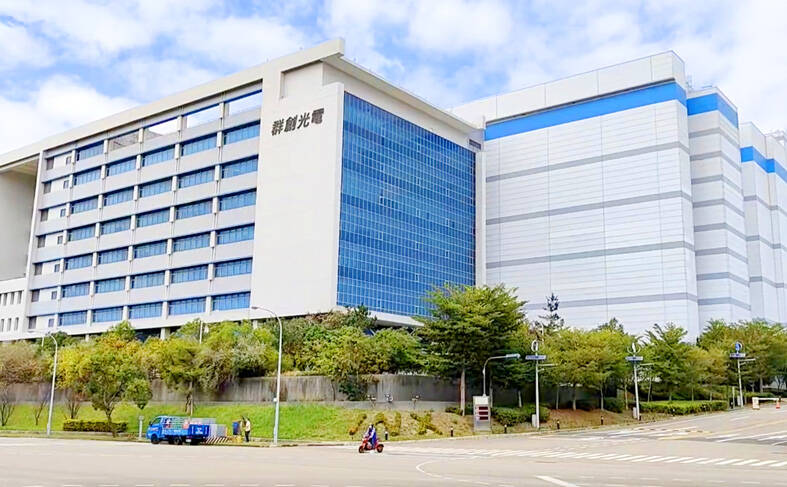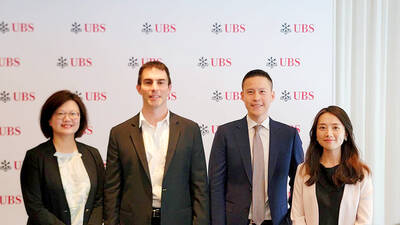Innolux Corp (群創) yesterday said it is seeking to optimize operations amid a lingering industry downcycle, while a news site reported that the LCD panel maker would cut 100 jobs at a factory in Miaoli County.
The Chinese-language Nextapple News Web site, citing an Innolux employee, yesterday reported that the Miaoli-based company asked about 100 people to resign.
Most of the workers are at the company’s T1 factory in Miaoli, where it makes less advanced panels, the report said.

Photo provided by a reader via CNA
The severance program is to take effect on Monday next week, the report said.
Like its peers, Innolux is cutting factory utilization to buffer against falling panel prices.
Although Innolux confirmed it was making workforce adjustments, it did not disclose details or say how many workers would be affected.
“After a careful and extensive evaluation, the company will streamline its management entirely,” it said in a statement. “The main measures will encompass optimal adjustments in structure and production lines, with an aim to strengthen the company’s development and business deployments.”
The manufacturer said it has communicated with affected employees, and would seek to make appropriate arrangements and work allocations.
Innolux reported a net loss of NT$1.9 billion (NT$60.3 million) last quarter, compared with a loss of NT$5.47 billion in the second quarter.
That was the company’s sixth straight quarter of losses as adverse macroeconomic conditions affected customer demand, while high inflation depressed consumer spending.
Consolidated revenue in the first 11 months of the year fell 7 percent year-on-year to NT$193.07 billion, the company said in a regulatory filing last week.
Innolux is pinning its hopes on a turnaround next year, as the Olympic Games and other major sporting events could stimulate demand for TVs and related components, Innolux president James Yang (楊柱祥) told reporters last week.
The introduction of new smartphones and notebook computers with artificial intelligence capabilities would also help boost panel demand, he said.

TECH TITAN: Pandemic-era demand for semiconductors turbocharged the nation’s GDP per capita to surpass South Korea’s, but it still remains half that of Singapore Taiwan is set to surpass South Korea this year in terms of wealth for the first time in more than two decades, marking a shift in Asia’s economic ranks made possible by the ascent of Taiwan Semiconductor Manufacturing Co (TSMC, 台積電). According to the latest forecasts released on Thursday by the central bank, Taiwan’s GDP is expected to expand 4.55 percent this year, a further upward revision from the 4.45 percent estimate made by the statistics bureau last month. The growth trajectory puts Taiwan on track to exceed South Korea’s GDP per capita — a key measure of living standards — a

Samsung Electronics Co shares jumped 4.47 percent yesterday after reports it has won approval from Nvidia Corp for the use of advanced high-bandwidth memory (HBM) chips, which marks a breakthrough for the South Korean technology leader. The stock closed at 83,500 won in Seoul, the highest since July 31 last year. Yesterday’s gain comes after local media, including the Korea Economic Daily, reported that Samsung’s 12-layer HBM3E product recently passed Nvidia’s qualification tests. That clears the components for use in the artificial intelligence (AI) accelerators essential to the training of AI models from ChatGPT to DeepSeek (深度求索), and finally allows Samsung

READY TO HELP: Should TSMC require assistance, the government would fully cooperate in helping to speed up the establishment of the Chiayi plant, an official said Taiwan Semiconductor Manufacturing Co (TSMC, 台積電) yesterday said its investment plans in Taiwan are “unchanged” amid speculation that the chipmaker might have suspended construction work on its second chip packaging plant in Chiayi County and plans to move equipment arranged for the plant to the US. The Chinese-language Economic Daily News reported earlier yesterday that TSMC had halted the construction of the chip packaging plant, which was scheduled to be completed next year and begin mass production in 2028. TSMC did not directly address whether construction of the plant had halted, but said its investment plans in Taiwan remain “unchanged.” The chipmaker started

LOOKING BRIGHT: Taiwanese tech stocks have been trading at 18 to 19 times earnings, beating the 15 percent long-term average amid AI-driven optimism, an analyst said Taiwan’s economy could expand by as much as 5 percent this year, fueled by its technology manufacturing edge amid a global artificial intelligence (AI) boom, while tariff exemptions on semiconductor products keep the country’s levy burden low despite a headline rate of 20 percent, UBS Investment Bank said yesterday. “Although Washington has imposed a 20 percent tariff on goods from Taiwan, exemptions for semiconductors keep the weighted average low,” UBS senior economist for Asia and China William Deng (鄧維慎) said. The growth momentum is expected to extend into next year, with technology companies’ revenue projected to rise 17 percent, UBS research head